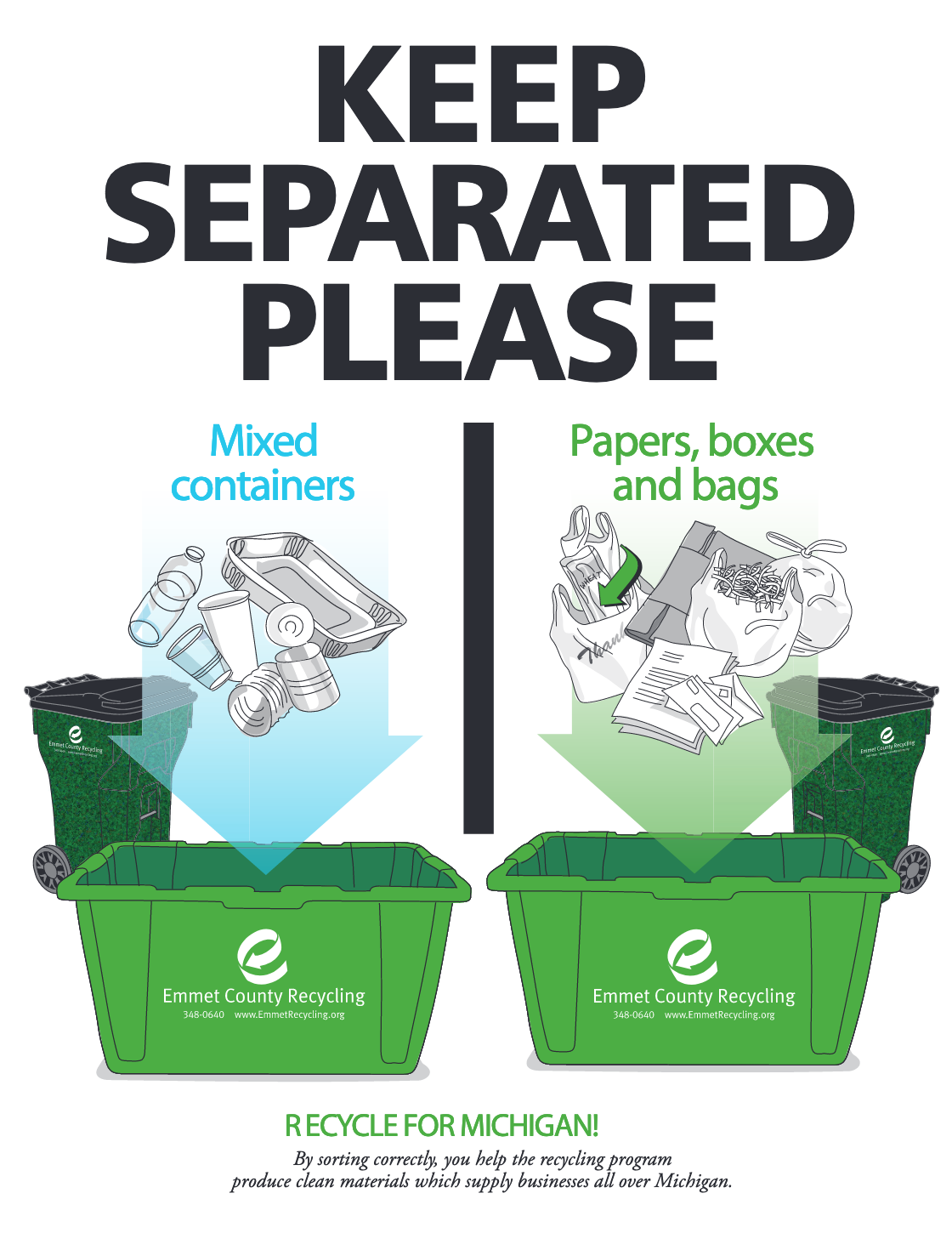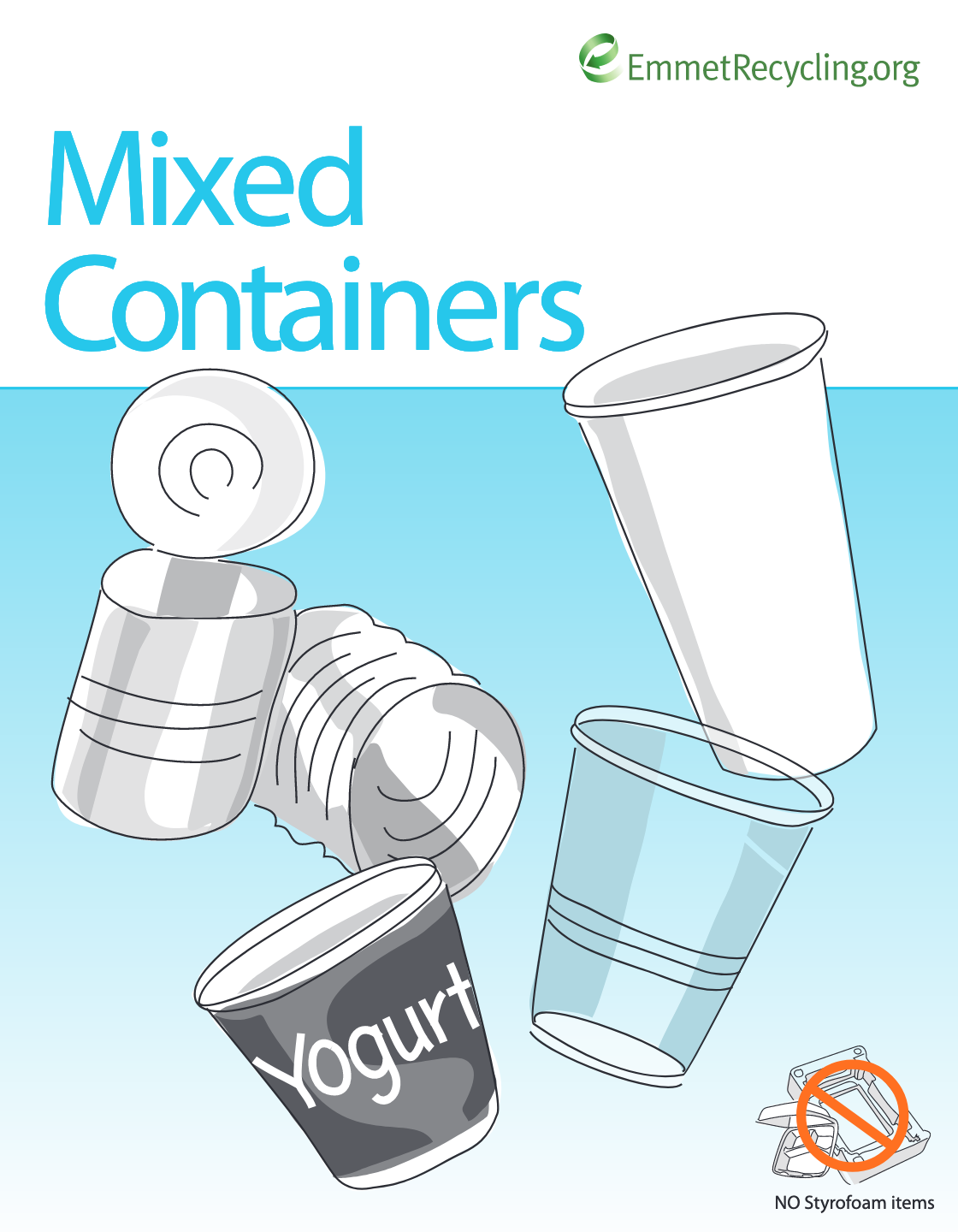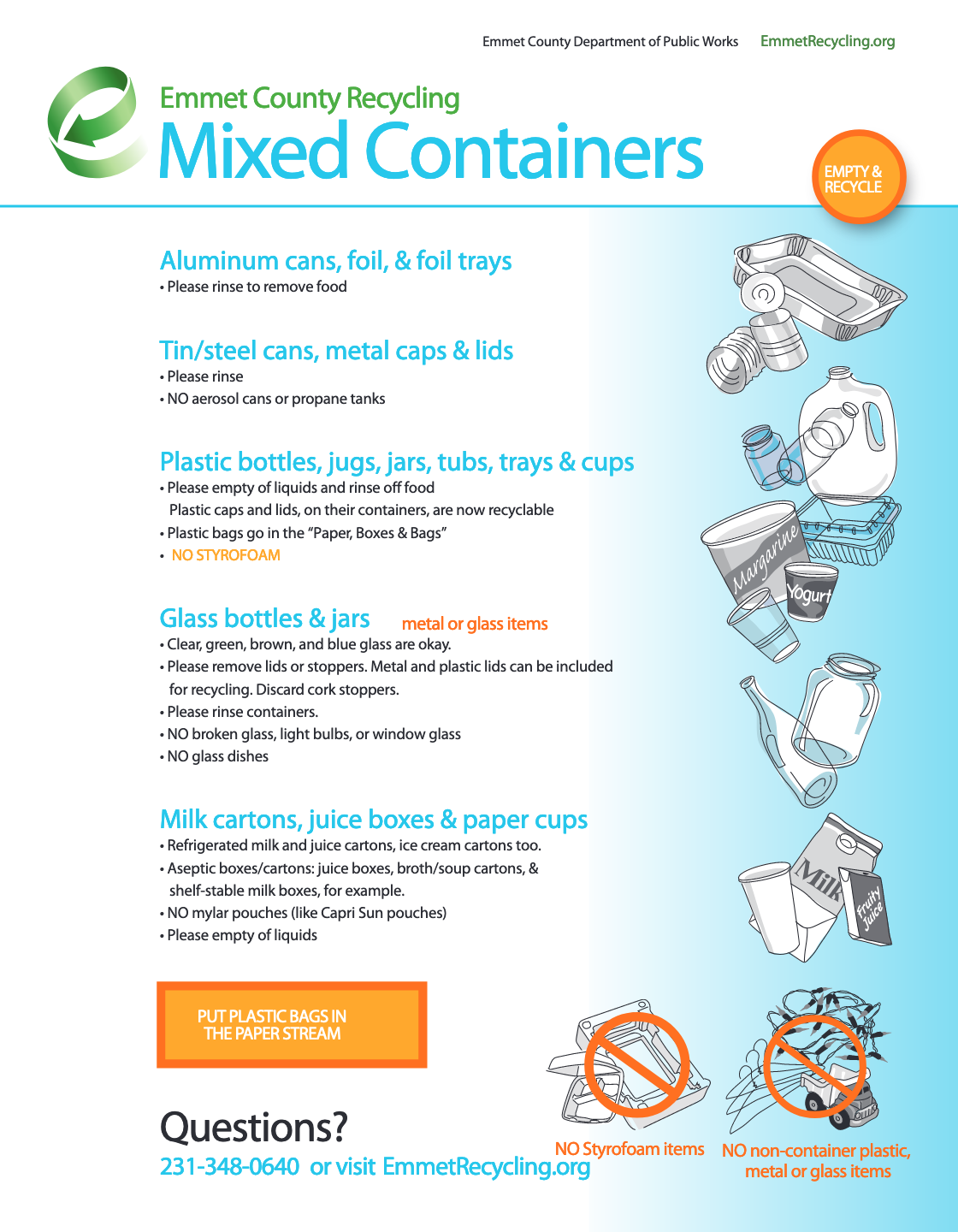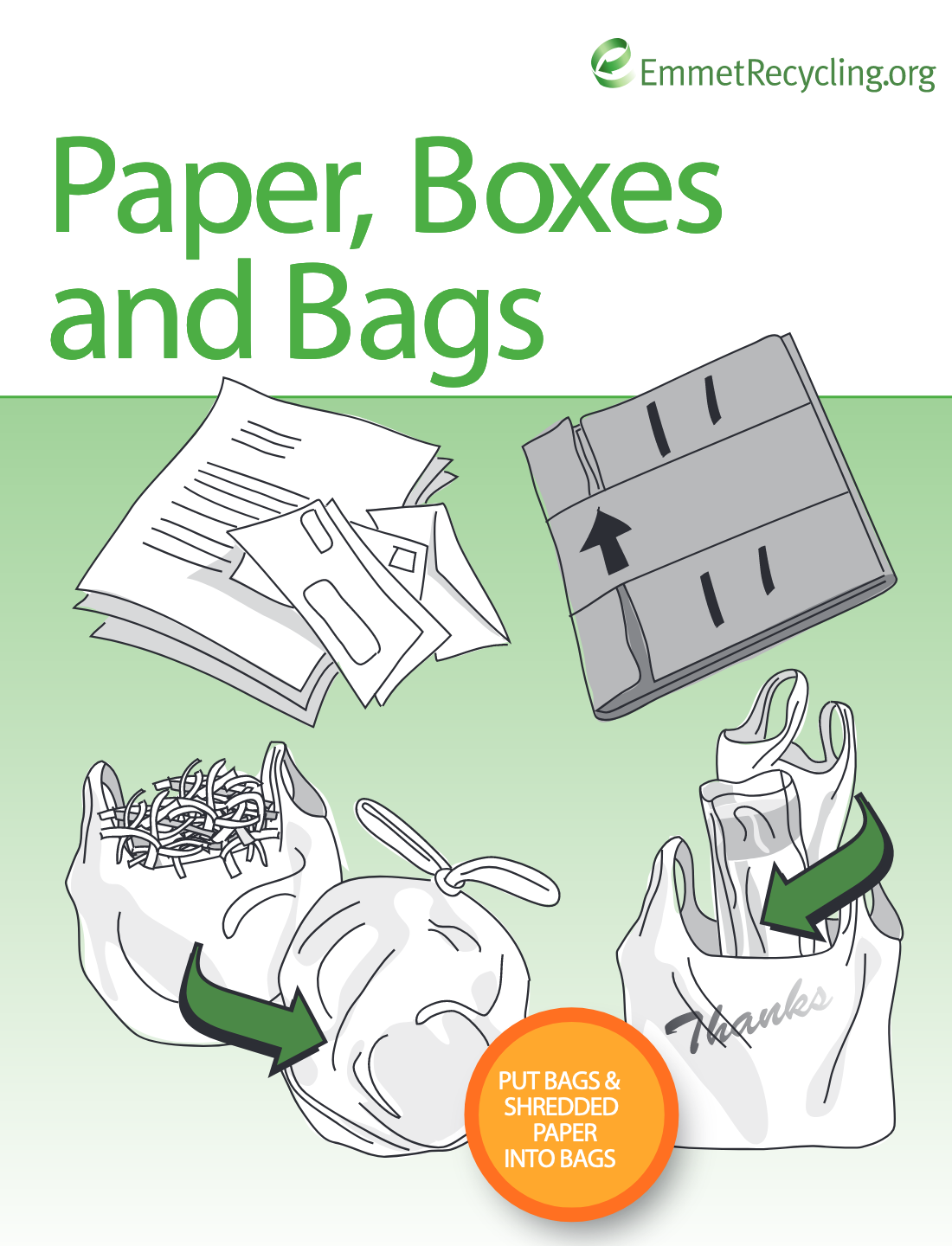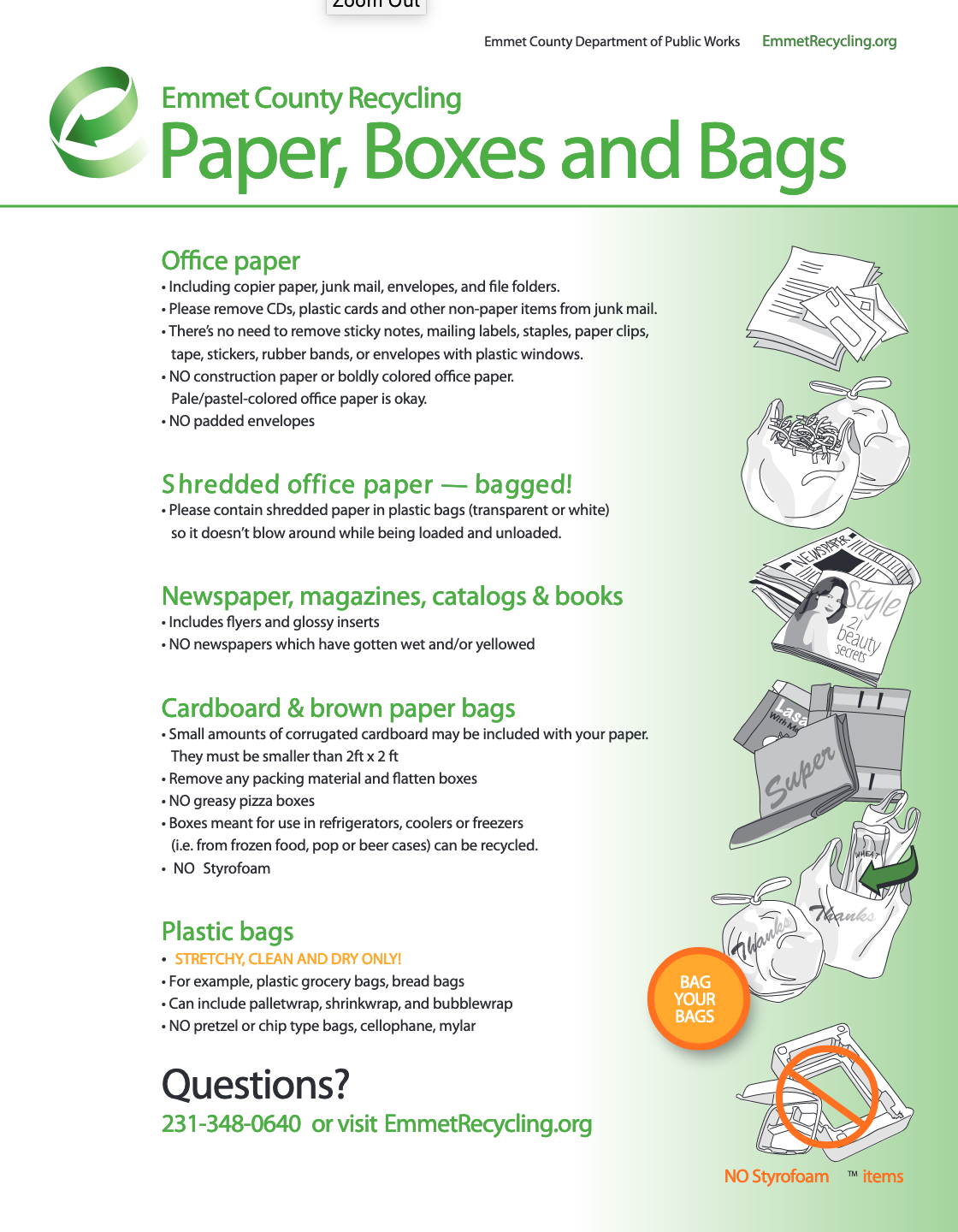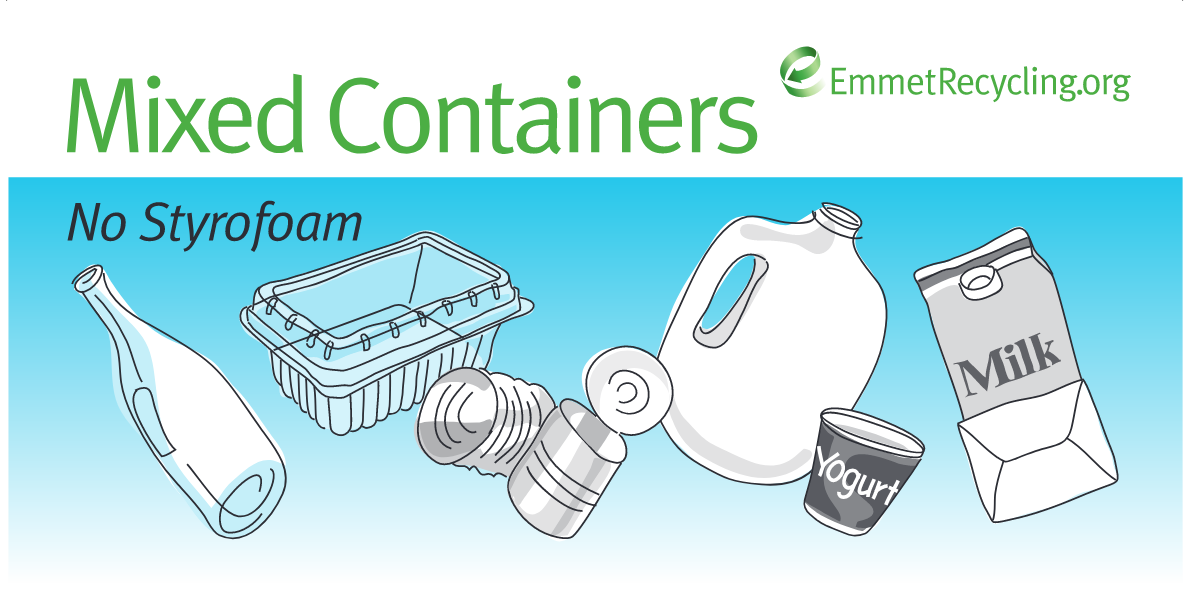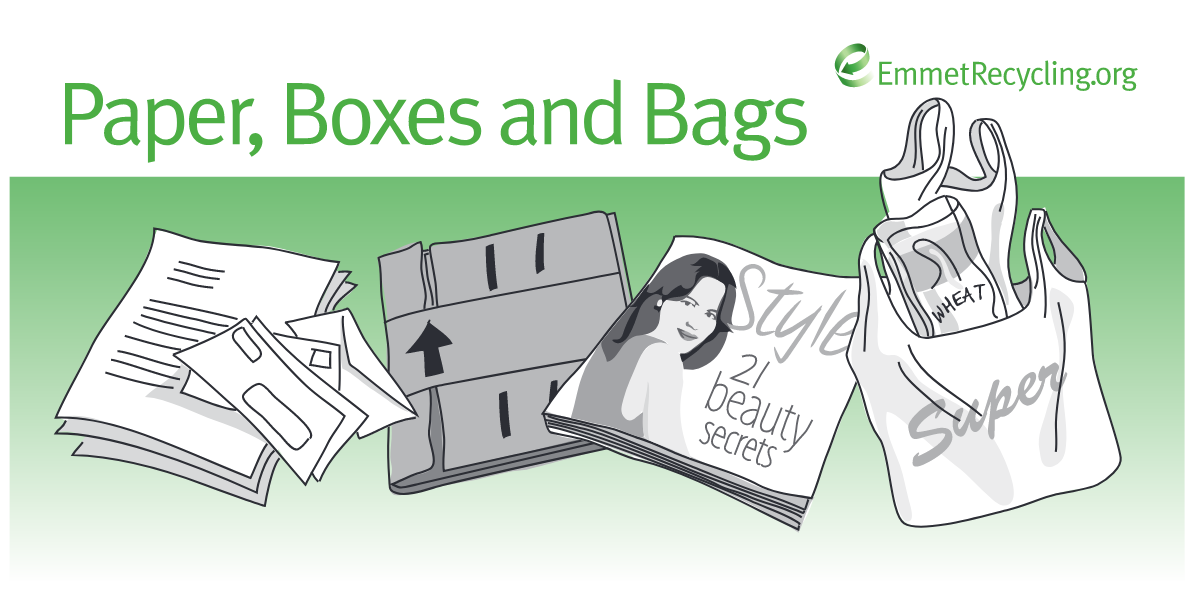Cafeteria RecyclingMaintenance RecyclingClassroom RecyclingJanitorial RecyclingResoures & SignsCreate a Recycling Team
School Recycling Toolkit
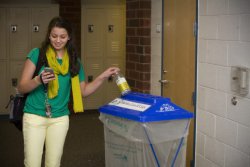
This toolkit has been created by Emmet County Recycling (ECR) to provide ideas for recycling in your school. Please take a moment to look over this guide. It covers all aspects of recycling in the school, such as creating a recycling team, cafeteria recycling, classroom recycling, recycling information for janitorial staff, and recycling resources.
Cafeteria Program
Train Cafeteria Staff
- Ensure that the staff understands the difference between Mixed Containers and Paper, Boxes and Bags bins and where they are located. Some examples of what goes in each bin are:
- Paper, boxes and bags-Cereal boxes, dry paper plates, plastic and paper bags. (Large cardboard should be collected in a specific location other than a bin. All boxes should be flattened before placing them in the container.)
- Mixed containers- Any kind of plastic, aluminum, or paper cups or cans. Water bottles, milk, and juice cartons. Yogurt and other plastic containers. (No Styrofoam or liquids)
- It is important to understand the difference between recyclable materials and food-contaminated materials like pizza boxes, napkins, spoons, forks and knives.
- Brainstorm ways to eliminate waste such as Styrofoam and food waste throughout the kitchen.
Food waste prevention
35% of waste generated in Emmet County is food waste and a large volume comes from the schools. LeanPath is a software program that helps commercial kitchens prevent food waste, and in return, saves money. Learn more about LeanPath at Leanpath.com
Carton recycling
Carton recycling is an important component in reducing waste throughout schools. Cafeterias are the most common places to recycle cartons, along with classrooms where milk cartons and juice boxes are consumed.Set up a carton-recycling station with:
- A bucket to dump liquids
- Signs to ensure that students understand the process
- A container for the empty cartons are needed. The container can simply be the mixed containers bin. More helpful resources can be found at recyclecartons.com.
Waste Free Lunch- an example of waste reduction
Whether students bring lunch from home or buy it at school, there’s almost always room for waste diversion. A waste-free lunch program is a process of educating students, parents, and school staff about where our trash ends up and how we, as individuals, can reduce the amount of trash we generate. Waste-free lunch programs favor the use of reusable food containers, drink containers, utensils, and napkins. They discourage the use of disposable packaging, such as prepackaged foods, plastic bags, juice boxes and pouches, paper napkins, and disposable utensils.
$723.60 (disposable) – $477.00 (waste free) = $246.60 savings per school year per person
Recycling for Maintenance and Janitorial Staff
Schools generate recyclable waste other than mixed containers and paper, boxes, and bags. Some examples are fluorescent bulbs, batteries, electronics, large cardboard, books, cleaner containers, appliances, pallets, and more. All of these materials are recyclable at our Drop-Off Center located at 7363 Pleasantview Rd, in Harbor Springs. We are open Monday-Friday 8-4 and Saturday 8-3.
Electronics Recycling
Everything and anything with a cord or battery can be recycled at the Pleasantview Drop-off Center for a small fee.
Recycling Batteries from Classrooms
Battery collection containers are available upon request. Once the container is full, the teacher may empty the container at one of the following locations.
- Petoskey-Meyer Ace Hardware or Radio Shack
- Pellston-Cook’s Hardware
- Harbor Springs- Meyer Ace Hardware and Preston Feather Building Center or ECR’s Drop-Off Center
- Alanson-W.W. Fairbairn & Sons
Recycling Light Bulbs
Fluorescent light bulbs are recyclable at the Pleasantview Drop-off Center for a small fee.
Inkjet Cartridges
Click here for information on how and where to recycle your printer cartridges.
Click here to see the all of the details on batteries and bulbs recycling.
Resources and Printable Signs
- Carton council school recycling - recyclecartons.com
- For more school recycling information visit Michigan.gov
- Recycling guides- Emmet County Recycling has guides for the recycling team explaining what can be recycled through the curbside pick-up service, as well as what can be recycled at the Drop-Off Center located at 7363 Pleasantview Rd, Harbor Springs.
- Posters- Emmet County Recycling can provide templates of posters to be printed and posted throughout the school explaining how to properly recycle. Another option to involve students is to hold a poster design contest.
- Recycling Fundraising-Recycling certain materials can provide a source of funding to your school. Terracycle accepts a wide array of materials that are generated throughout the school. Inkjet cartridges, pens, juice pouches, chip bags and more can be recycled to raise money for your school! Check out terracycle.com for more information.
Click the Images for Printable Signs
Recycling Team
Create the team: invite:
- Janitors
- Administrators
- Clubs
- Students
- Teachers
Assign a recycling coordinator to oversee all recycling procedures and be the contact for ECR. The coordinator can be anybody who has an interest in recycling whether it is a teacher, student, parent, administrator or janitor. This person ensures that the system flows in order for the recyclable materials to find their way to the curbside recycling truck and all of the steps in between.
Determine placement of bins: The janitorial staff is aware of the waste collection routes throughout the school. The recycling team should work together to create a map of the school that will be most the effective route for collecting recyclables. This will also help create an understanding of the amount of bins that will be required for the school.Recycling bins should always be placed next to garbage cans. Some ideas for placement of the bins other than in classrooms are:
- A paper bin in the copy room and any offices or art classrooms
- A mixed containers bin in the gym, cafeteria, hallways, etc.
Some other questions that need to be answered are:
- How will the recyclables be transported from classrooms to collection areas?
- Who will be responsible for moving the recyclables to the storage area from the library, cafeteria, teacher work area, office and other areas of the school?
- How will collections bins be moved outside for pickup?
- What happens if there is contamination (ex. garbage in the recycle bins, containers in the paper, boxes and bags bin or liquid in the containers bin?)

